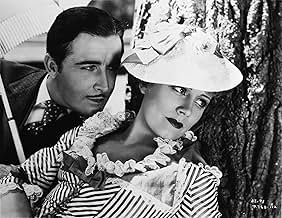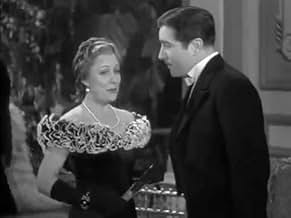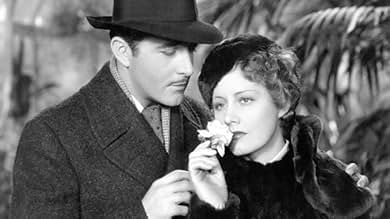CALIFICACIÓN DE IMDb
6.2/10
564
TU CALIFICACIÓN
Agrega una trama en tu idiomaAn engaged attorney and a divorcee fall for each other in 1870s Manhattan.An engaged attorney and a divorcee fall for each other in 1870s Manhattan.An engaged attorney and a divorcee fall for each other in 1870s Manhattan.
- Dirección
- Guionistas
- Elenco
- Premios
- 3 premios ganados en total
Barry O'Moore
- Mr. Welland
- (as Herbert Yost)
Lowden Adams
- Jenkins
- (sin créditos)
Muriel Barr
- Miss Allison - Jenkins' Daughter
- (sin créditos)
Harry Beresford
- Museum Guard
- (sin créditos)
Lynn Browning
- Miss Archer
- (sin créditos)
Herbert Bunston
- W.J. Letterblair
- (sin créditos)
Bess Flowers
- Child's Mother
- (sin créditos)
Alf James
- Man Who Comes with Chairs
- (sin créditos)
John Merton
- John
- (sin créditos)
Opiniones destacadas
A lawyer attempting to obtain a divorce for a countess finds his growing love resisted by THE AGE OF INNOCENCE in which they lived.
Edith Wharton's celebrated novel, illustrating how personal happiness is often crushed by public propriety, is given a fine adaptation in this well-produced film from Radio Pictures. While the movie relentlessly features almost nothing but dialogue, it is always sophisticated and deals with matters still of some importance.
In a movie with so much talk the performances are paramount and they are all of a high order. Lovely Irene Dunne is radiant as the American countess restricted by society from following her heart. John Boles is very effective as the lawyer who must also either bow to convention or be crushed by it. Feisty Helen Westley steals nearly every scene she's in as Dunne's wealthy and outspoken Granny. Laura Hope Crews is perfectly cast as Westley's slightly flustered daughter, the mother of Boles' pretty fiancée, Julie Haydon. Herbert Yost is Crews' meek little husband, while splendid Lionel Atwill enjoys himself as a rich rascal operating on society's fringe.
Movie mavens will recognize Harry Beresford as a canny museum guard and Inez Palange as a stubborn Italian maid, both uncredited.
The jazzy montage which opens the film has virtually no relationship to anything that follows and serves only to wake the audience up.
Edith Wharton's celebrated novel, illustrating how personal happiness is often crushed by public propriety, is given a fine adaptation in this well-produced film from Radio Pictures. While the movie relentlessly features almost nothing but dialogue, it is always sophisticated and deals with matters still of some importance.
In a movie with so much talk the performances are paramount and they are all of a high order. Lovely Irene Dunne is radiant as the American countess restricted by society from following her heart. John Boles is very effective as the lawyer who must also either bow to convention or be crushed by it. Feisty Helen Westley steals nearly every scene she's in as Dunne's wealthy and outspoken Granny. Laura Hope Crews is perfectly cast as Westley's slightly flustered daughter, the mother of Boles' pretty fiancée, Julie Haydon. Herbert Yost is Crews' meek little husband, while splendid Lionel Atwill enjoys himself as a rich rascal operating on society's fringe.
Movie mavens will recognize Harry Beresford as a canny museum guard and Inez Palange as a stubborn Italian maid, both uncredited.
The jazzy montage which opens the film has virtually no relationship to anything that follows and serves only to wake the audience up.
I have seen Scorsese's film many times and have always loved the luxurious attention to detail, but always thought Mae was miscast and there wasn't much humor, it was more of a melodramatic romance than a statement on values and morals of the time, so I was hesitant to watch this version, figuring it would be boring and predictable...
Instead, I was pleasantly surprised, this film actually had the depth, humor and awareness that I did not find in Scorsese's film. The movie is also remarkably adult for its time, and totally believable as well as faithful to the novel; the dialog was crisp, quick and mature and the story moved along steadily.
Nobody seems miscast or out of place and unlike other reviewers, I didn't find any problem with John Bole's performance, I thought he conveyed exactly what he was supposed to and was even less wimpy than Daniel Day-Lewis's performance in the Scorsese film.
Overall I recommend this version highly, and while I do prefer the pace of this film, it will never compare to the visual sumptuousness of the Scorsese version.
Instead, I was pleasantly surprised, this film actually had the depth, humor and awareness that I did not find in Scorsese's film. The movie is also remarkably adult for its time, and totally believable as well as faithful to the novel; the dialog was crisp, quick and mature and the story moved along steadily.
Nobody seems miscast or out of place and unlike other reviewers, I didn't find any problem with John Bole's performance, I thought he conveyed exactly what he was supposed to and was even less wimpy than Daniel Day-Lewis's performance in the Scorsese film.
Overall I recommend this version highly, and while I do prefer the pace of this film, it will never compare to the visual sumptuousness of the Scorsese version.
THE AGE OF INNOCENCE (RKO 1934) (81 minutes)
There have been three film versions of Edith Wharton's most renowned novel, The Age of Innocence. The 1924 silent version is lost. We are left with Martin Scorcese's definitive 1993 version in wide screen and color, derived from the novel itself with its multitude of characters and subplots, and this charming early talkie, based on a play version of the book.
Although the plot and narrative have been pared down considerably, the meat of the matter is still here and it is given first class treatment. Irene Dunne is radiant (when was she not?) in the role of the expatriate family member, Ellen, married into European royalty, and returned to 1870s New York Society, and John Boles gives a solid reading of the tortured Newland, a young lawyer betrothed to marry May Mingott, an innocent ingenue, while falling in love with her cousin, the experienced Ellen. It is true melodrama, a touching and tragic love story, played out in lush Hollywood style.
The sets are excellent as is the detailed and creative costume design. Helen Westley, in but 9 scenes, steals the show as the wise and down to earth Granny Mingott, while Julie Haydon over emotes as the clueless May. Max Steiner's score relies heavily on Tchaikovsky, whose song, None But The Lonely Heart, serves as the main motif running throughout the film. Mason and Heerman, who had just won a Screenplay Oscar for Little Women, deliver a marvelous adaptation, as they would for many more novels, including Magnificent Obsession, Imitation of Life, Golden Boy, and Stella Dallas. There is a long and frantic montage at the film's beginning, establishing the mood of Jazz Age madness and scandalous headlines, against which the calm staidness of New York 19th century society will be played out.
Westley and Dunne would appear opposite each other two years later in SHOW BOAT, while Laura Hope Crewes (as Mrs. Welland) and costume designer, Walter Plunkett, would be paired for 1939's Gone With The Wind.
The available dvd print is impeccably crisp and clean. Although the categories had not yet been created in 1934, a supporting actress nod would be due Helen Westley and a costume design nomination is due Walter Plunkett, in my humble opinion.
If you love Wharton, you will enjoy both the Scorcese version and this lovely gem from Hollywood's golden decade.
There have been three film versions of Edith Wharton's most renowned novel, The Age of Innocence. The 1924 silent version is lost. We are left with Martin Scorcese's definitive 1993 version in wide screen and color, derived from the novel itself with its multitude of characters and subplots, and this charming early talkie, based on a play version of the book.
Although the plot and narrative have been pared down considerably, the meat of the matter is still here and it is given first class treatment. Irene Dunne is radiant (when was she not?) in the role of the expatriate family member, Ellen, married into European royalty, and returned to 1870s New York Society, and John Boles gives a solid reading of the tortured Newland, a young lawyer betrothed to marry May Mingott, an innocent ingenue, while falling in love with her cousin, the experienced Ellen. It is true melodrama, a touching and tragic love story, played out in lush Hollywood style.
The sets are excellent as is the detailed and creative costume design. Helen Westley, in but 9 scenes, steals the show as the wise and down to earth Granny Mingott, while Julie Haydon over emotes as the clueless May. Max Steiner's score relies heavily on Tchaikovsky, whose song, None But The Lonely Heart, serves as the main motif running throughout the film. Mason and Heerman, who had just won a Screenplay Oscar for Little Women, deliver a marvelous adaptation, as they would for many more novels, including Magnificent Obsession, Imitation of Life, Golden Boy, and Stella Dallas. There is a long and frantic montage at the film's beginning, establishing the mood of Jazz Age madness and scandalous headlines, against which the calm staidness of New York 19th century society will be played out.
Westley and Dunne would appear opposite each other two years later in SHOW BOAT, while Laura Hope Crewes (as Mrs. Welland) and costume designer, Walter Plunkett, would be paired for 1939's Gone With The Wind.
The available dvd print is impeccably crisp and clean. Although the categories had not yet been created in 1934, a supporting actress nod would be due Helen Westley and a costume design nomination is due Walter Plunkett, in my humble opinion.
If you love Wharton, you will enjoy both the Scorcese version and this lovely gem from Hollywood's golden decade.
This "Age of Innocence" from 1934, of course, cannot even approach the sumptuous beauty.amazing acting, and rich story-telling of the Martin Scorsese "Age of Innocence" from 1993 starring Daniel Day-Lewis, Winona Ryder, and Michelle Pfeiffer.
The 1934 movie stars Irene Dunne as Ellen, John Boles as Newland, and Julie Haydon as May.
The story is told in flashback by the elderly Newland. As a young attorney in the late 1800s, he was engaged to May when her cousin Ellen came to visit from Europe. She plans to divorce her husband and is a social outcast, as these things were never done. Newland and Ellen fall in love. Do they defy convention and marry? Or does Newland marry May as promised?
Irene Dunne is lovely as Ellen. She was an actress who could do comedy and drama. John Boles was a huge star and not a tremendous actor. That kind of look was considered attractive way back when; today it has gone out of style.
There are good performances, but there is no way to watch this film after seeing the Scorsese film. It is studio-made, looks dull, and is dull. This is a story with a great deal of depth that seems untouched here -- lots going on underneath all the gentility, the trap of conventions -- here told as an ordinary story.
Helen Westley is wonderful as the cousins' grandmother, as is Laura Hope Crews as Dunne's aunt and May's mother. Lionel Atwill is also on hand as a married man who is a friend of Dunne's, an unacceptable situation.
The novel was also adapted into a play, on Broadway starring Katherine Cornell as Ellen and Franchot Tone as Newland.
If you haven't seen the stunning Scorsese film, see it.
The 1934 movie stars Irene Dunne as Ellen, John Boles as Newland, and Julie Haydon as May.
The story is told in flashback by the elderly Newland. As a young attorney in the late 1800s, he was engaged to May when her cousin Ellen came to visit from Europe. She plans to divorce her husband and is a social outcast, as these things were never done. Newland and Ellen fall in love. Do they defy convention and marry? Or does Newland marry May as promised?
Irene Dunne is lovely as Ellen. She was an actress who could do comedy and drama. John Boles was a huge star and not a tremendous actor. That kind of look was considered attractive way back when; today it has gone out of style.
There are good performances, but there is no way to watch this film after seeing the Scorsese film. It is studio-made, looks dull, and is dull. This is a story with a great deal of depth that seems untouched here -- lots going on underneath all the gentility, the trap of conventions -- here told as an ordinary story.
Helen Westley is wonderful as the cousins' grandmother, as is Laura Hope Crews as Dunne's aunt and May's mother. Lionel Atwill is also on hand as a married man who is a friend of Dunne's, an unacceptable situation.
The novel was also adapted into a play, on Broadway starring Katherine Cornell as Ellen and Franchot Tone as Newland.
If you haven't seen the stunning Scorsese film, see it.
Irene Dunne shines in this fine(one must remember it was the post-code 1930s)adaptation of the Edith Wharton novel, as Countess Ellen Olenska, an american born member of New York's high society, who was raised and married in Europe, far way from that city's strict society conventions, now an outsider in her own family. She returns to New York city because she wants to divorce her polish aristocrat husband, where she falls in love with young lawyer Newland Archer, her cousin's fiancé.
John Boles, as usual, is just so-so as Newland Archer, although I must say, that upon watching the movie I felt he was much more effective when impersonating him in his old age. This actor always reminds me of Robert Taylor, because although the latter achieved superstar stardom and had better looks, their acting abilities and inexpressiveness are roughly equivalent. As well, both served as "escorts" in many star vehicles of notable 1930s female stars: Irene Dunne, Barbara Stanwyck, etc.
Miss Dunne, an excellent comedienne and dramatic actress, had previously worked with Boles in the 1932 weepie "Back Street", and this film's plot is in the same category. She looks very beautiful indeed in period clothing. Julie Haydon is rightly "controlled" and restrained, as her cousin May.
Helen Westley gives the greatest performance among the supporting players, as Old Dowager Mrs. Manson Mingott, both Countess Olenska's and May's understanding and very warm grandmother. Laura Hope Crews is very good as Dunne's stuffy and very concerned aunt (and May's mother), and Lionel Atwill plays an unscrupulous "married man of bad reputation" who befriends Dunne, in spite of the scandal it may cause, in the opinion of her family.
Recommended viewing for '30s movie fans.
John Boles, as usual, is just so-so as Newland Archer, although I must say, that upon watching the movie I felt he was much more effective when impersonating him in his old age. This actor always reminds me of Robert Taylor, because although the latter achieved superstar stardom and had better looks, their acting abilities and inexpressiveness are roughly equivalent. As well, both served as "escorts" in many star vehicles of notable 1930s female stars: Irene Dunne, Barbara Stanwyck, etc.
Miss Dunne, an excellent comedienne and dramatic actress, had previously worked with Boles in the 1932 weepie "Back Street", and this film's plot is in the same category. She looks very beautiful indeed in period clothing. Julie Haydon is rightly "controlled" and restrained, as her cousin May.
Helen Westley gives the greatest performance among the supporting players, as Old Dowager Mrs. Manson Mingott, both Countess Olenska's and May's understanding and very warm grandmother. Laura Hope Crews is very good as Dunne's stuffy and very concerned aunt (and May's mother), and Lionel Atwill plays an unscrupulous "married man of bad reputation" who befriends Dunne, in spite of the scandal it may cause, in the opinion of her family.
Recommended viewing for '30s movie fans.
¿Sabías que…?
- TriviaThe original Broadway production starred Katharine Cornell as Ellen Olenska, and Franchot Tone as Newland Archer.
- ErroresAs evidenced by a dated letter, Newland assisted Ellen with her divorce case in August 1879. Newland and May were married just after the following Easter, which would make it 1879. After returning from their honeymoon, they receive an invitation for a party on Wednesday, October 2nd. That would be correct if it was still 1878, but in 1879, October 2nd was a Thursday.
- Citas
Julius Beaufort: After all your exquisite associations over there, how do you think you're going to like it here?
Ellen: I think it quite like heaven.
Julius Beaufort: Yes, I have that feeling too sometimes. You mean, just some place to go after you're dead?
- ConexionesReferences Sin novedad en el frente (1930)
- Bandas sonorasNone But the Lonely Heart
(1869) (uncredited)
Music by Pyotr Ilyich Tchaikovsky
Played during the opening credits and often as background music
Selecciones populares
Inicia sesión para calificar y agrega a la lista de videos para obtener recomendaciones personalizadas
- How long is The Age of Innocence?Con tecnología de Alexa
Detalles
- Fecha de lanzamiento
- País de origen
- Idiomas
- También se conoce como
- The Age of Innocence
- Locaciones de filmación
- Productora
- Ver más créditos de la compañía en IMDbPro
- Tiempo de ejecución
- 1h 21min(81 min)
- Color
- Relación de aspecto
- 1.37 : 1
Contribuir a esta página
Sugiere una edición o agrega el contenido que falta

































